Looking for food writing jobs that will let you generate a dependable income while doing what you love?
Good news!
The food industry has many opportunities for freelance writers. So many opportunities that it’s easy to get overwhelmed.
That’s why you’ll need to focus and get your bearings.
Start by asking yourself what you love most about food culture.
Do you enjoy visiting different restaurants and sampling delectable new cuisines? Perhaps you love to cook and develop your own savory recipes. Or maybe you’re an expert on preparing herbs from the garden and want to share your know-how with the world.
Whatever your passion, you’ll need a roadmap to launch your freelance food writing journey.
And that’s exactly what we’ve put together for you here.

7 Juicy Tips for Landing Food Writing Jobs
Our adventure begins with learning basic content creation skills.
Then we’ll explore how to grow your business, generate income, and where you can discover some delicious freelance writing jobs.
1. Write Like a Pro
Although there are no formal educational requirements to be a food writer, you need to ask yourself a couple questions…
Do you need to brush up on your writing skills?
Make sure your message makes an impression by:
- Catching their attention with great headlines
- Packing a punch with power words
- Avoiding fluff and filler words
Because good written communication skills are essential to your success.
Also, do you have writing samples of your work?
You’ll need these to make a good first impression and wow potential clients.
These are fundamental elements of your writing business and will go a long way toward helping you succeed as a freelance food writer.
2. Find the Sweet Spot (Where Passion Meets Demand)

In the beginning, gaining experience should be your first priority.
At some point, though, you’ll want to choose a niche.
This means focusing on a particular topic.
When you specialize in a niche you’ll develop expertise in that subject area. You’ll not only write faster, but businesses will be willing to pay you more because you understand their audience and industry.
That’s why it’s important to choose a niche that interests you. Perhaps one where you already have expertise or a topic you’re eager to learn about.
For example, you may want to write in one of these food-related industries:
- Health and wellness
- Fitness
- Travel
- Food science
- Food safety
- Organic food
- Vegan food
The key is to zero in on a topic that you’ll enjoy and that’s profitable.
3. Gain Knowledge and Experience
It’s ideal for a food writer to get hands-on experience in the food industry. You’ll have an edge if you’ve worked full-time (or even part-time) in a food-related job.
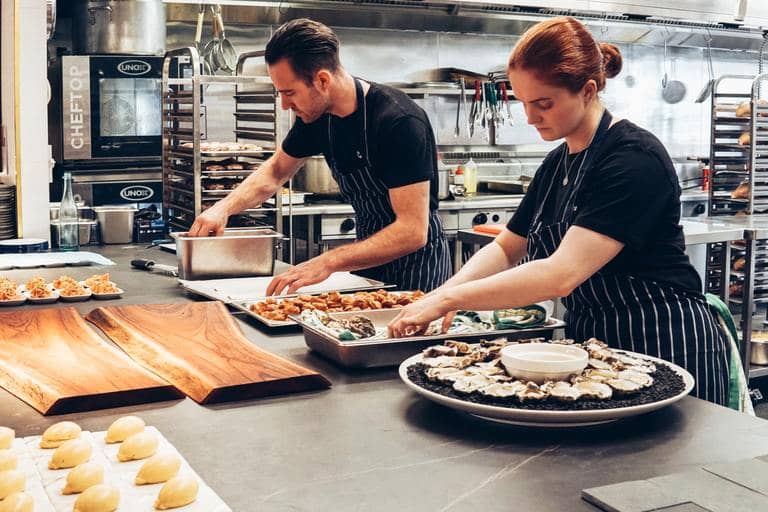
However, that’s not always possible. If that’s the case, you can get experience in other ways:
- Volunteer in a food-related job such as a local food bank.
- Take courses through your local community or online.
- Read government nutrition websites such as:
You can also analyze top food blogs to discover relevant topics and deepen your knowledge.
Simply google “top food blogs” and you’ll find plenty to review.
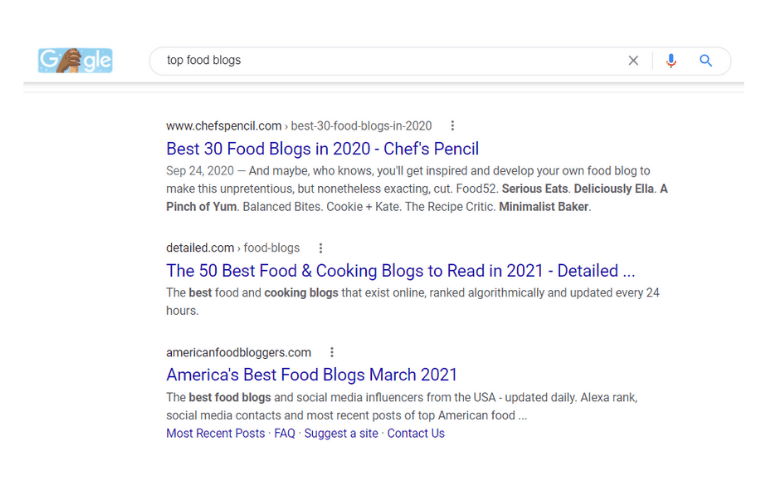
4. Network and Connect
Food writers need to network.
Building relationships and establishing business connections are important and can often lead to new work and opportunities for a freelancer.

Let’s take a look at different ways to network:
- In-Person Networking: Attend industry events to meet editors and get your foot in the door.
- LinkedIn: Follow editors and influencers, connect with other food writers, and identify businesses in your niche.
- Virtual Networking: Network with other food professionals in Facebook groups, on Twitter, or in forums. Then follow up and build relationships on LinkedIn.
5. Focus on the Low Hanging Fruit
Let’s look at three basic strategies to get your food writing business off and running:
Write About Current Trends
Keep an eye on industry news and write articles on new products and markets.
Here are a few sites to keep you informed:
You can also sign up with Google Trends to receive email notifications from Google on any topic you choose.
But that’s not the only way to research trends on Google.
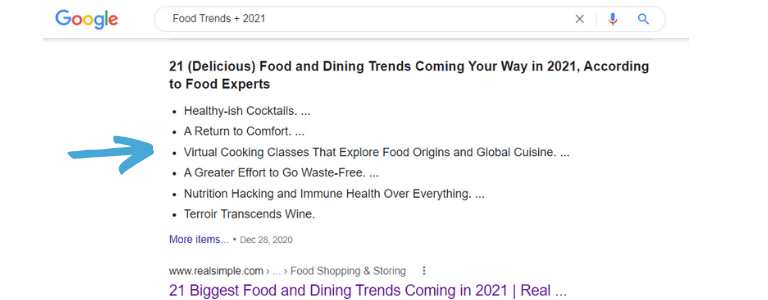
For example, if you search for “food trends in 2021,” one topic that comes up is “virtual cooking classes,” giving you an idea for a potentially interesting and relevant article to pitch.
Write a Human Interest Story
Get out there.
Visit a local farmers market and talk to mom-and-pop business owners.
You’ll often find compelling food stories waiting to be discovered.
Check Out Job Boards
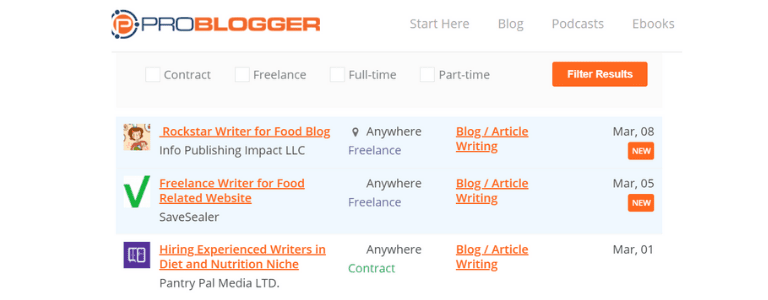
Job Boards make it easy to find food writing jobs and are a great resource when you’re just starting out.
There are numerous job boards to find freelance writing work. Here are a few to get you started:
Google can also be helpful.
For example, take a look at these food writer jobs:
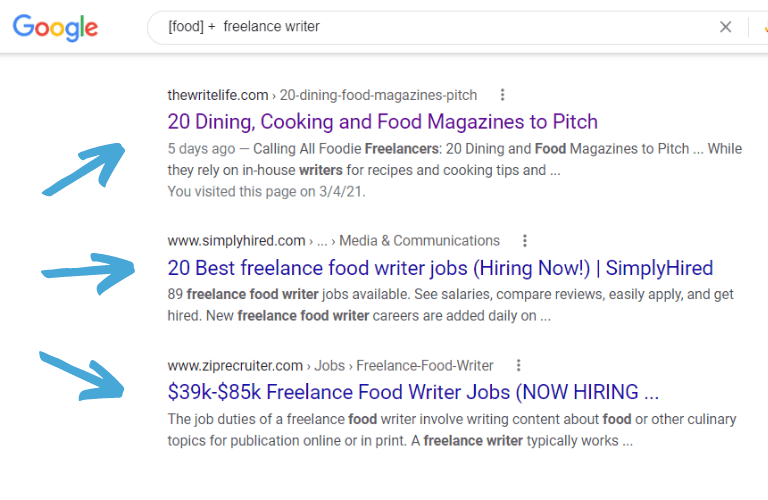
Is there a demand for food writers?
Definitely!
6. Go Digital
Traditional food writing jobs for print magazines are few and far between.
The food editor or food critic jobs for these magazines often sound glamorous and exciting, but they are not an easy entry point into food writing.
In fact, it takes a long time and a lot of hard work to secure these positions. You can always pursue these opportunities later, once you’ve gained more experience as a freelancer.
You’re better off focusing your efforts around food industry blogs, digital trade publications, and online magazines.
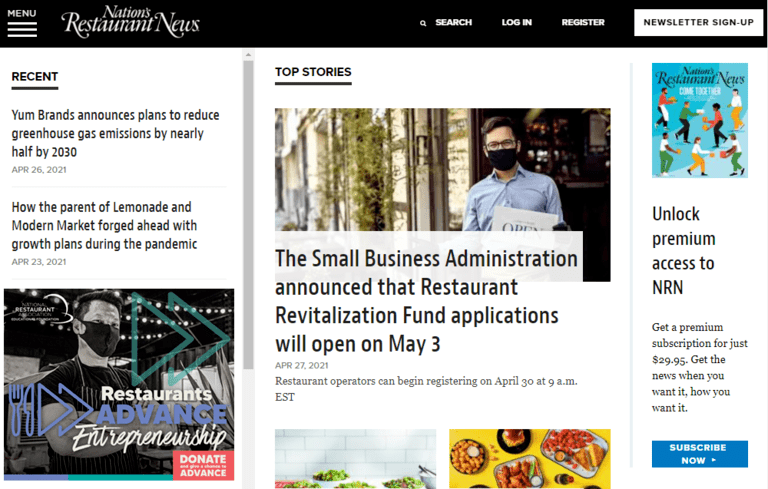
The businesses listed in these publications need your writing skills and talents. They also need content for their websites, including:
- Blog articles
- Website copy
- Emails and newsletters
- Social media posts
- Advertising copy
As you can see, there’s no lack of work or opportunities.
7. Get Paid
I can already hear you asking, “Just how much does a food writer make?”
Let’s take a look.
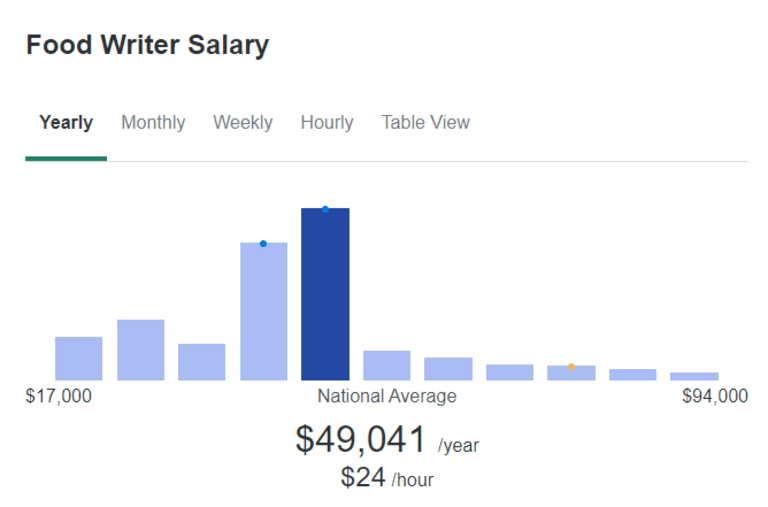
The amount of money you earn for your writing will depend on the publication.
Many magazines and websites pay freelancers by the word. But, there’s a wide range when it comes to getting paid: anywhere from $.04 – $1.00 per word.
Doing your homework is important.
Here are a couple sites that can give you an idea of what payment you can expect to receive for different writing jobs:
You may be wondering what the highest-paying writing jobs are.
The reality is, if you want to earn big bucks as a freelance writer, you’ll want to revisit what we discussed earlier and improve your writing skills.
These skills also include learning content marketing and search engine optimization (SEO), copywriting, and email marketing.
For example, email marketing has the potential to pay writers large sums of money. According to Glassdoor, email marketers can expect to earn between $40,000 – $100,000 per year.
Why?
Because of the high return on investment (ROI).
According to Oberlo, email marketing can expect to bring in $42 for every $1 spent. Businesses reap the profits, and writers are paid accordingly.
So don’t hesitate to launch your food writing business, the work (and money) is out there.
Food Writing Jobs are Yours for the Taking
Even if it’s your passion, food writing requires hard work.
Perseverance is essential.
Set and follow a daily routine. Consistently seek out new food writing jobs. And continue to network, both online and in-person (when possible).
Focus on the low-hanging fruit to get started. And choose one of these techniques so you can jumpstart your business.
Do all of these things, and soon you’ll find yourself getting published and generating an income from your writing.
Good luck!
The post Getting Started with Food Writing Jobs: 7 Tasty Tips for Beginners appeared first on Smart Blogger.

No comments:
Post a Comment